#he’s such a hypocrite and projects everything onto Izuku
Text
The other day I wanted to post about that silly bedroom competition bc I was amusedly curious. If Kirishima ranks 2nd place in the bedrooms you don’t want your boyfriend to have,
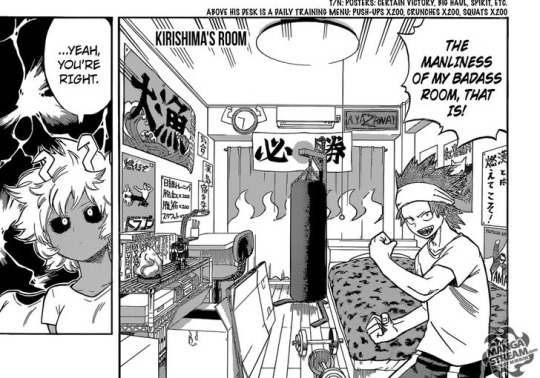
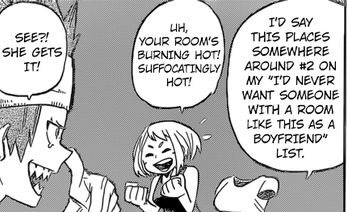
then who took first place?
Was it Aoyama?
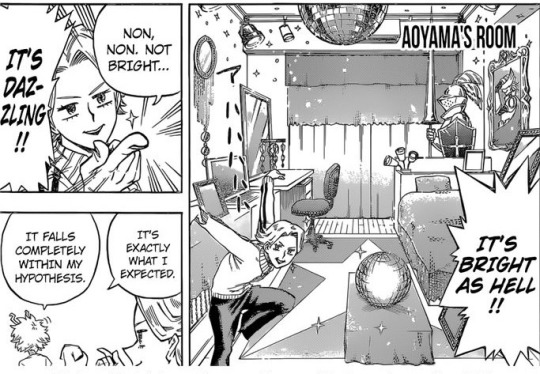
Or Izuku?
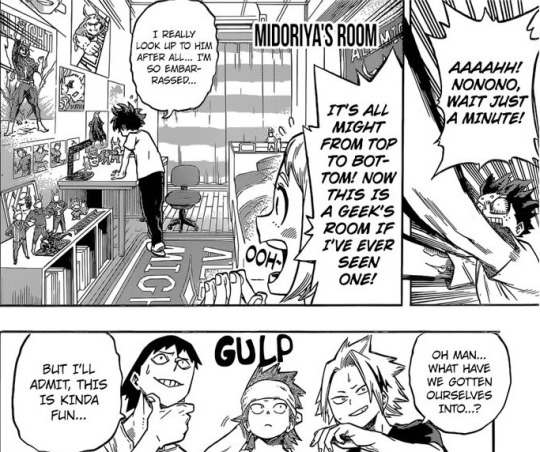
But now I’m just sitting here crying and don’t care what the girls think anymore. Izuku’s room is actually Kacchan’s fave and is now officially the lowest in their stupid ranking bc his opinion is the only one that matters. 😭
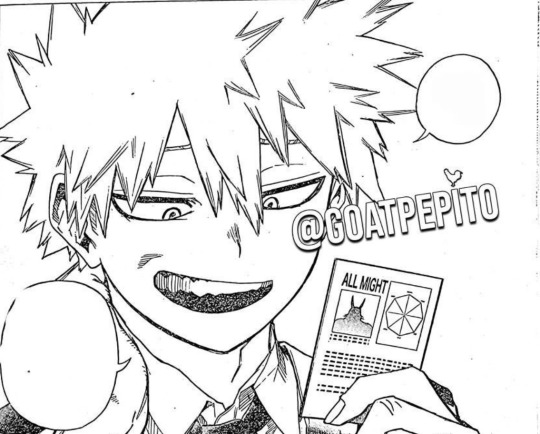
I love you with my whole heart, you repressed shitty nerd 😭❤️
#bakudeku#Bnha 362#mha 362#he’s such a hypocrite and projects everything onto Izuku#calling him kuso nerd bc he’s still an all might enjoyed and obsessed over heroes#but this whole time he’s just a geek too 😭#HE JUST WANTED ALL MIGHT TO SIGN HIS CARD#I CANT#my heart is a black void of sorrow rn#Kacchan loves deku#💔💥😭#Bnha manga spoilers#anyone else just really sad rn#I need therapy this hurts like hell#Izuku pls come collect your boyfriend he needs you right now
60 notes
·
View notes
Text
Chp 270- From AfO’s POV vs Tomura’s
I am suuuuper late to this party
K so this is like unedited but fucknkit it’s super long and fun. I see a lot about how hero society is misunderstanding Tomura, but not a lot about how AfO might be, so I wanted to write this.
I believe that in chapter 270, AfO believes that he’s successfully pushed Tomura to throw away all his best traits- but he’s failed epically and he doesn’t even realize it, because he misinterprets Tomura’s actions. Namely, AfO is projecting symbolism and moral coding onto actions that have very different meanings to Tenko.
It should also be noted that I strongly believe that the entire dream is fictional- Nana isn’t actually there, there are no ghosts beyond AfO himself present, and the whole thing is symbolism rather than actual people. I also strongly suspect that AfO designed/controlled the whole dream, beyond Tomura’s own actions. This will be reflected in my writings.
To elaborate:
/./././././././././././././././
First, establishing why I think Horikoshi can write with insight
So something I notice Horikoshi is wont to do is looking at the story from the POV of our non-POV character(s) and asking ‘okay what would they believe/think/do with the information they have.’
For example, Todoroki’s guess at the Sports Festival- that Midoriya is All Might’s secret love child- comes across as hilarious to the audience because it seems so far out of left field, and Midoriya is shocked because it’s out of left field for him as well. But when you think about it, this is a completely natural assumption for Shoto to make with the information he has. Yes I know people joke about this and there’s a thousand reasons readers claim the idea was foolish, but when you really think about the scenario without our pre-existing knowledge- Shouto really was making a logical guess with the information he has (and his personal history) since in-universe quirks are genuinely completely unique, beyond bloodline inheritance. I already wrote up a walk-through a potential line of thought for Shouto If we assume he thought through this theory before apprehending Midoriya about it: https://bluebeirry.tumblr.com/post/617845821257498624/so-for-personal-reasons-along-with-a-theory-i-may it’s on this link
Shouto’s guess in that scene wasn’t merely a gag, but a well thought-out step on Horikoshi’s behalf to show logical, intelligent thought coming from a character lacking critical information. In that hallway scene, Shouto wasn’t being written as a conspiracy theorist or socially inept- although he’s definitely the latter, that particular trait is not the driving force behind Shouto’s guess. In the hallway scene, Shouto was being written as a https://yudkowsky.tumblr.com/writing/level1intelligent Level 1 intelligent character. I’ll let the link explain why this matters and why it's a big deal, but the importance is that this scene serves as evidence that Horikoshi can write level 1 intelligent characters. He can give his characters https://yudkowsky.tumblr.com/writing/thoughtful-responses thoughtful responses and intelligent mistakes based on the information THEY have.
Now that this is clarified, onto Tomura and AFO.
Horikoshi’s ability to write Level 1 intelligent characters- and to separate character knowledge from audience knowledge- is key to why I think AfO greatly misunderstands what’s going on with Tomura in the chp 270 fever-dream.
First, let’s go through the scene and analyze it for symbolism, interpretations, and character analysis from our own PoVs. As in, using the information we know- which as you’ll see encompasses information AfO would know- we’ll analyze what Tomura’s dream means to us.
So let’s look at the scene from AfO’s perspective.
What does Tomura’s family mean to AfO?
Tomura’s family is his past. It’s the love of his lost ones, and yes, to a degree, it’s death. Joining them would be death. But they’re also love, normalcy, and the childhood he lost so long ago. And yes, Kotaro isn’t a part of that love- but he is a part of that childhood, and a part of being ‘normal.’
Hatred and pain can be ‘normal’ if caused by ‘normal’ things. IMO Kotaro was put in there partially to ensure Tomura wouldn’t choose the love of the rest of his family, since Kotaro served as a reminder that the old life of Tenko wasn’t all sunshine and roses. Kotaro was the pain that Tenko had to endure in order to also have the love and protection of his childhood. Kotaro was intertwined with the love of Hana and Nao.
(And me repeat this is what I think AfO would interpret)
What does the destruction of the dead Shimura family mean to AfO?
Rejection of the love, normalcy, and acceptance into a stable- if imperfect- environment. Tomura joining the dead Shimuras he killed would have been giving in and choosing that life and that love over the life that’s ahead of him- the life AfO built for him.
Tomura turning from his family is therefore symbolic of him turning from love, and acceptance.
Ironically I think AfO is right about this dream pushing Tomura into rejecting the possibility of societal acceptance, but not for the reasons AfO thinks- this will be discussed later in Tomura’s section.
What does AfO mean to himself?
This one’s simple- AfO sees himself as a symbol of evil. He says it over and over, he brags about it, his minions hail him as one, he’s one of the most despicable characters in the manga because he does everything For the Evulz.
AfO sees himself as the symbol of evil- and to choose him is to choose the life of evil.
What does AfO think he means to Tomura?
This we get from further flashbacks. We know that AfO wants to turn Tomura into a ‘symbol of fear,’ and that’s exactly what he thinks he is to Tomura. Just as AfO sees himself as a symbol of evil, he sees himself to Tomura as Tomura’s path/role as a symbol of fear. In choosing AfO over his family, AfO sees it as giving Tomura two options- love (and death), or becoming what AfO wants him to be.
See, we the audience and AfO know full well that AfO is pulling Tomura’s strings- that he’s been nothing but a puppet from the beginning. So this plays into AfO’s interpretation of the dream as well.
What does Tomura accepting AfO mean to AfO?
AfO sees Tomura choosing him over the Shimuras as Tomura embracing the role AfO has planned for him. It’s Tomura choosing to be a symbol of fear. Combined with rejecting the Shimura’s, it’s Tomura choosing the Symbol of Fear as his only future, all other options now gone forever.
What does Nana Shimura mean to AfO?
The same thing all One for All users mean to AfO- she’s a Symbol of Good. The alternative path to evil. For all his brilliance, AfO sees the world in very much a black-and-white sort of mindset, and he enforces and pushes this mindset onto others.
What do Nana’s words mean to AfO?
“Don’t forget” means “Don’t forget what it’s like to be good.” AfO sees the rejection of Nana as the rejection of ‘goodness.’ If the Shimura family are neither ‘good’ nor ‘bad,’ but simply the only life AfO thinks Tomura can lead that will bring him love, then Nana is the concept of ‘good’ specifically. Rejecting the Shimuras solidifies Tomura’s rejection of any other path in life, but rejecting Nana as well is the rejection of all things good.
“Once you’ve accumulated both hatred and joy, you will truly be free” -AFO
The next thing we need to establish is that thanks to AfO’s upbringing, Tomura’s mind has been warped in certain ways. There are concepts which most people assign to specific words, that Tomura doesn’t. ‘Good’ and ‘evil’- it’s well-established that he doesn’t think much of these terms, if at all. He says outright ‘it’s my right to destroy what I don’t like’ while AfO is listening, and later he tells Izuku that (as far as he knows) everyone destroys what they don’t like. The reason the world still stands is because (again as far as he knows) Tomura has an unusually high desire to destroy. It’s something AfO told him directly (chp 237), and it sets Tomura apart from everyone else, making him an outcast and an outsider.
Thing is, AfO actually has a very strong moral understanding of right and wrong- he actively chooses to do the wrong thing BECAUSE it is ‘evil’ and that gets him off or something. AfO taught Tomura to view the world a twisted way, even though he himself views the world very differently.
But. For all that he’s brilliant, AfO tends to see the world in black and white- and he tries to push this view onto others as well. It’s something he shares with hero society- labeling everyone as ‘good’ or ‘bad’ is prevalent there as well. He raised Tomura to choose the ‘evil’ path, but forgot that in the process he told him things like ‘morals aren’t real.’ AfO looks at the results of Tomura’s actions and sees him as evil, but he doesn’t realize that to Tomura, that binary switch of ‘good’ and ‘evil’ doesn’t exist.
That’s why All Might confused Tomura. That’s why Stain’s popularity pissed him off. Tomura’s mind may be warped, but he lacks the good/evil complex that almost everyone else in the story has, and that blinds them all to the true nature of things.
See, Tomura’s philosophy- that people destroy what they don’t like- betrays something about him that I don’t think AfO realizes: Tomura isn’t a hypocrite, and he believes that EVERYONE has the right to destroy what they don’t like. Likewise, the reverse applies- you have the right to preserve/protect what you like. This is reflected in how he’s willing to let his companions/friends keep the things they love, because they should be able to destroy or keep things as well.
Now I’m going to pick the scene apart from Tomura’s perspective, by asking several questions at each major point.
What do Tomura’s sister and mother mean to him?
So first of all I want to say that I do believe that Tenko didn’t deliberately kill his family (perhaps barring his father). That is opinion, however, and unproven, so I’m going to instead say this: whether or not he killed his family on purpose, he still loved them- and possibly still does love them. A moment of rage, while in shock and traumatized, can cause horrible results- kids that age regularly scream and break things in fits. Kids with supernatural abilities could easily kill someone in a fit. Likewise, we know he felt guilty after their deaths- accident or intentional, there were still positive feelings for at least some of his family.
Now to the actual fever dream- I notice that with both his mother and his sister, Tomura shows compassion. He tells Hana not to worry about hurting him with a smile that personally I think shows forgiveness, but at the very least it isn’t cruel. He tells his mother he’s fine, and he shows her compassion as well. I think Tomura still loves his mother and sister.
But the most pressing piece of evidence that this is the case is the way his family looks at him when they’re holding him back. Minus his father, every single one is looking sad. It’s guilt that they provide, guilt that makes their hands a challenge to overcome. Guilt- over leaving the people he loves.
What does Tomura’s father mean to him?
With Tomura’s father, it’s the exact opposite. He represents opposition, something destroyed, something to hate. Hatred, too, can drag a person down and hold them back. Where the rest of the family clings to Tomura’s arms, Kotaro pushes him down head-first. His face, when destroyed by Tomura, mimics that of the face he made when he tried to kill Tenko- it’s the culmination of all the hatred Tomura has for his father represented in this form.
And the thing is, this too can drag Tomura down into death. Hatred alone can only go so far, and while it can be a powerful motivating factor it also causes suffering for the one who feels it. If you hate the living, you’ve got a goal and you can use that hate- but if you hate something or someone that’s far beyond your reach, you’re helpless to have an outlet or use that suffering in any way, and it only causes pain. Much like love becomes grief when love cannot be manifested.
Tomura is letting go of his father the same way he lets go of his mother and sisters. The emotions may be opposites, but the results are the same. He may always hate his father, but in destroying his ghost Tomura affirms that he won’t let that hatred hold him back.
What does the destruction of the dead Shimura family mean to Tomura?
Different things for each of them- some love, some hate, but the one thing all of them share is that they’re dead. He’s not. If he stays, if he lets them hold him back- he’s staying with ghosts. This isn’t about good vs evil, or love vs apathy- it’s about letting go of the past and moving on. It’s about not letting your pain distract you from what you could have in the now. Contrary to AfO’s viewpoint, the inclusion of Kotaro in the ‘ghosts’ holding Tomura back mean that if this was about the ability to love, it wouldn’t just be love that Tomura destroys as he walks forward- it’d be about hate as well. If anything, hate was literally the forefront emotion holding Tomura back- as NAMEHERE’s hand was the one pushing Tomura’s face, the most present and pressing one. Love was something that drags behind, hate is something that pushes down, and Tomura let go of both here.
For Tomura, the destruction of his family is the destruction of his past in the context of the destruction of his pain. He’s letting go of his suffering- both from abuse and from loss of love- and moving on. Nothing less, nothing more.
What does AfO mean to Tomura?
According to the common definition of evil that you and I use, AfO isn’t ‘evil’ in the eyes of Tomura Shigaraki. Quite the contrary, AfO is the one who saved him- taught him, encouraged him. From Tomura’s perspective, AfO is improvement- rescue, safety, comfort, the league/friendship, nomu/strength, all of the things he gained only thanks to AfO. If Tomura used a normal vocabulary, I think he’d even go so far as to say that AfO is the biggest source of goodness in his life- as all the concepts we understand to be ‘good’ are concepts AfO represents for Tomura. AfO is the life Tomura could have, and the life he does have, so long as he doesn’t let the past drag him down. AfO isn’t just a person, AfO is a symbol for the future- for living life to it’s fullest.
In going towards AfO, walking away from his decayed family, Tomura sees himself letting behind the pain of his past and walking towards the future.
This may seem too easy- something he’s already done. But remember what he said to Re-Destro in chapter 235, right after he remembered his past?
ReDestro told him “There is no future for a world without creation”
Tomura replied “Future? Who needs that?”
In that moment, in those memories, Tomura didn’t really care about anything but destruction. He didn’t see a future for himself, and he didn’t want one. He wasn’t really thinking well- shock and exhaustion and trauma will do that to you. But the important thing is, Tomura established that after recalling his past, he did not care about having a future.
AfO, in an ironic twist, completely reversed the emotional impact that recalling his memories had on Tomura in the fever dream.
What Tomura gained from the fever dream was a desire to see what the future brings. Again, recall that his understanding of ‘the future’ is warped by his upbringing- he doesn’t have any long-term plans or anything like that. But he doesn’t want to die. He wasn’t exactly suicidal after recalling his trauma, but he also genuinely didn’t care if he lived or died, or even if he won. Now, after chapter 270, he cares about living again.
AfO isn’t a Symbol of Evil to Tomura- he’s just a symbol of life, and continuing on.
What does Nana Shimura mean to Tomura?
Now the big one. The biggest difference between AfO’s understanding of that scene and Tomura’s understanding of that scene. And all the similarities in their understandings are for completely different reasons. Because compared to the reader, Tomura knows very little about Nana Shimura. He knows three things:
1. She is his grandmother
2. She was a hero
3. She left his father behind in some manner
Thing is, he has no clue that AfO and Nana Shimura were connected in any way. As far as Tomura is concerned, Nana is part of HIS personal past, and nothing more.
When he first learned of her existence, young Tenko was elated- excited- thrilled. That elation is what Tomuraremembers when she shows up in the dream, and that tells us for certain what Tomura thinks of Nana. That despite her picture connecting to his punishment and his father’s wrath, young Tenko never connected Nana to anything besides his first reaction to her. Unsurprising, given he was a child, but we also know now that Tomura also doesn’t have any opinion on her beyond that first reaction.
To Tomura, Nana is a symbol for hero society in general. Something he longed to be part of as a child, when he didn’t know better, but no longer wants. The same society that ignored him when he needed help, pushed him into the gutters and neglected him when he was hurt, and broke each of his friends in turn. More critically, the same society that now demands his death (and while this is literal Tomura might not be aware of this fact- but he does know they’d lock him up and leave him to rot, a metaphorical death).
See, Tomura doesn’t know how Nana died- as far as he knows, she died in the line of duty as a hero (which is arguably true from a certain point of view). She accepted her ‘role’ was to die, and she did so- and now she’s telling Tomura to accept his ‘role’ and die as well.
So Tomura is rejecting Nana as he rejects the role Hero Society places on him and defines his own. He’s not particularly driven to accept this ‘role’ and he throws her off quickly- which is not surprising. If he were to take this ‘role’ and do the next ‘right’ thing according to it, he’d either die or surrender. And there’s nothing for him there- no reason to do so. It’s easy to see why he throws this off so quickly.
Again, it goes back to Tomura not being willing to die.
What do Nana’s words mean to Tomura?
Nana tells Tomura, “Don’t forget.” I think to Tomura, these words are reflections of society’s attempts to define him by that one horrible day in his past. “Don’t forget” means “don’t let go of any part of it,” means “define yourself by the memories,” means “don’t ever outgrow the pain” means “go back to the gutter where AfO found you.” It also could mean “remember the faith in the system you once held” and “remember that the bad guys always lose” and “accept the lot life has cast you.” And Tomura is having none of that.
Tomura was an outsider to society for almost all of his life- and he couldn’t remember ever being anything else until he recalled his past. Now, he knows what it’s like to have been a child in society- and what it was like to be at the bottom of the barrel.
What Tomura didn’t say is that he would or would not forget- because again, Nana’s words are to him about how he lives and defines himself, not whether or not he remembers. I don’t think Tomura will forget- he’ll always love his mother and sister and grandma and grandpa, and he’ll always hate his father. But he doesn’t have to define himself by their deaths. That is what he’s refusing to do, in refusing Nana’s request.
What I find striking is what Tomura said to Nana as he walked away-
“Don’t reject who I am.”
It’s not a threat, it’s not a refusal, it’s not a vow, it’s not even a plan or a goal of what to do next. “Don’t reject who I am” is merely a fact.
Nana, as a symbol for hero society, is the last thing that tries to bury Tomura in his past. More than his love, more than his hate, society itself judged him for his past and let him rot for it. Before he was found by AfO, society itself defined Tomura by his past- it held him back, because it gave him nowhere to go.
And this… this is something Tomura saw in his friends before he even remembered how it applied to himself- Spinner even gave a whole speech about society pushing him down. Hell, I’m willing to bet that it’s because he’s been hanging out with people who say society fucked them over that Tomura realized how society itself caused him problems. Arguably in destroying Nana, Tomura takes on the goal that the rest of the league has had for a good long while- tearing down the world that held them down.
He tells her, “Don’t reject who I am” because that’s what society has done to him and his friends over and over again. Because to Tomura, this entire dream is about letting go of his past. Not letting love, hate, or the opinions of society as a whole keep him from moving on. Every single aspect of the dream contributes to this theme- as far as he’s concerned this dream is entirely about recovering from his trauma.
To Tomura, the family that holds him back are manifestations of grief, hate, and finally societal rejection. Three factors that are all telling him he needs to die. It’s not a moral statement he makes when destroys them- it’s a thereputic one.
Any salvation for Tomura Shigaraki will come from his friends, and it will blindside AfO because AfO has been seeing Tomura’s journey in terms of ‘good and ‘evil,’ when in truth his journey has always been about ‘suffering’ versus ‘fuck the suffering, and fuck whatever caused it.’ The question is whether or not AfO will become a cause of suffering for Tomura’s followers- because AfO knows better than to turn on Tomura before the final blow is certain. The only way I can see AfO being surprised by Tomura is if he does something to hurt Tomura’s friends, thinking that ‘evil’ Tomura won’t care or will help, and then being shocked when Tomura turns on him in rage. Because fuck the suffering, and fuck whatever- or whoever- caused it.
1 note
·
View note